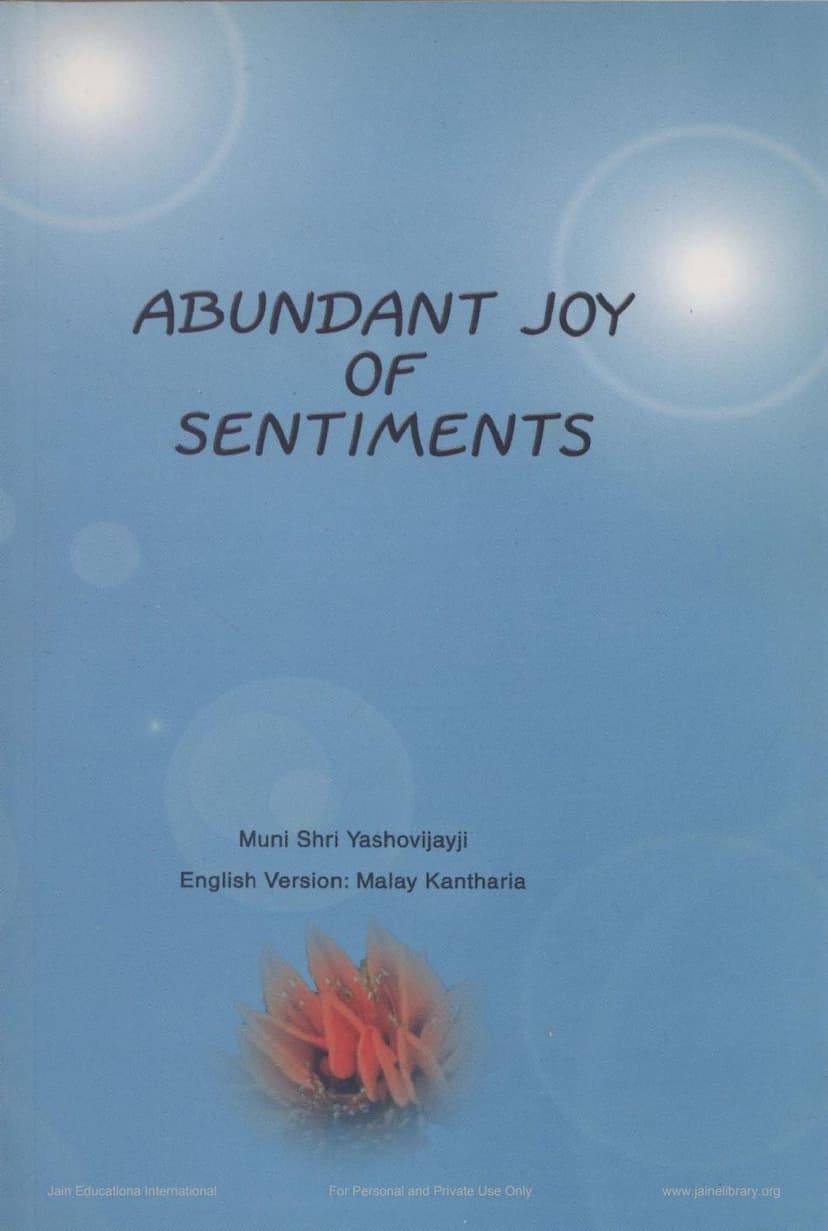Abundant Joy Of Sentiments
Added to library: September 1, 2025

Summary
Here's a comprehensive summary of the Jain text "Abundant Joy of Sentiments" by Muni Shri Yashovijayji, based on the provided pages:
Book Title: Abundant Joy of Sentiments Author: Muni Shri Yashovijayji Publisher: Yashovijay Jain Granthmala English Version By: Malay Kantharia
Overview:
"Abundant Joy of Sentiments" is a collection of spiritual discourses or prayers presented in an English translation. The book is characterized by its deeply devotional and emotional tone, where the author, Muni Shri Yashovijayji, addresses the Supreme Being (Bhagwan) with profound reverence, yearning, and a spirit of surrender. The core theme revolves around the intense longing of a devotee for union with the Divine, exploring various facets of this spiritual journey.
Key Themes and Content:
The book is structured as a series of dialogues or reflections addressed to the Supreme Being, covering a wide range of sentiments and spiritual insights. Here are some of the prominent themes and discussions found within the text:
-
Intense Devotion and Longing: The central sentiment throughout the book is an overwhelming love and yearning for the Supreme Being. The author expresses a deep desire to be in constant communion, experiencing the divine presence in every aspect of life. This longing is often described as an "intimate anxiety" and a constant "search."
-
The Nature of the Supreme Being: The Supreme Being is portrayed as the ultimate reality, a source of love, knowledge, and bliss. However, the author also grapples with the Supreme Being's perceived silence, formlessness, and hiddenness, which fuels the longing for direct "Darshan" (vision or encounter). The Supreme Being is seen as both present and elusive, a source of both comfort and a profound sense of separation.
-
The Devotee's Journey: The book details the spiritual path of the devotee, characterized by:
- Surrender: A complete yielding of oneself to the divine will, relinquishing ego, desires, and worldly attachments.
- Purification: The process of shedding negative traits like anger, lust, ego, greed, and illusion, and cultivating virtues like compassion, humility, and love.
- Self-Reflection and Introspection: The author frequently examines his own shortcomings, weaknesses, and internal conflicts, seeking divine guidance to overcome them.
- Perseverance: Despite the perceived distance and silence of the Divine, the devotee remains steadfast in his search and devotion, vowing to continue the journey across lifetimes if necessary.
- The Power of Words and Silence: The text explores the interplay between words and silence in the spiritual quest. While words are a medium for expressing devotion, true communion often involves transcending words and embracing silence.
-
The Paradox of Presence and Absence: A recurring theme is the paradox of the Supreme Being being both intimately present within and seemingly absent from external perception. This creates a state of "joyful freedom" and intense longing simultaneously.
-
The Role of "Sentiments": The title itself highlights the importance of "sentiments." These are not mere emotions but deep-seated feelings, devotion, and internal experiences that form the very fabric of the spiritual connection. The author believes these sentiments are the key to realizing the Divine.
-
Transformation and Realization: The ultimate goal is the union with the Supreme Being, a state of complete transformation where the individual soul merges with the Universal Soul. This is described as a journey of five stages, leading to the attainment of the Supreme Soul in its pure, blissful, and immortal form.
-
Challenging and Persuading the Divine: In a unique and deeply personal manner, the author engages in a dialogue with the Supreme Being, expressing both profound adoration and, at times, a gentle challenging or persuasion. This reflects the devotee's belief that their intense devotion can influence the Divine's presence and response.
Specific Chapters and Their Essence (Illustrative Examples):
While a chapter-by-chapter breakdown would be extensive, here are some examples of the sentiments explored in individual "chapters" or addressed topics:
- "You Can Not Hate Me": Expresses the devotee's complete surrender and the unshakeable belief that, having shed worldly attachments, the Supreme Being cannot reject them.
- "Your Silence Is Not Helpful to Me": A plea for the Supreme Being to break their silence and reveal themselves, as silence, though profound, is difficult for the devotee to interpret.
- "Never There Be the Death of Remembrance": A fervent request to the Supreme Being to remain constantly in the devotee's memory, as this remembrance is life itself.
- "My 'Sadhana' is for Your Search": Declares that all spiritual practices are solely for the purpose of finding and connecting with the Divine.
- "Have You Got Hunger of Devotion? Or Are You Begging for Devotion?": A playful yet profound questioning of the Divine's reciprocation of love and devotion.
- "The Fifth Step There Gets Manifested the Supreme Soul": Outlines a spiritual path comprising five stages of transformation leading to union with the Divine.
- "I Want to be Robbed Off, If You Are a Robber": A paradoxical statement expressing a willingness to be completely taken over by the Divine, even if it means being "robbed" of oneself.
Overall Impact and Message:
"Abundant Joy of Sentiments" is a testament to the profound depth of spiritual love and yearning. It offers a model of unwavering faith, heartfelt devotion, and the transformative power of surrendering to the Divine. The book emphasizes that the spiritual journey is personal and deeply emotional, involving a continuous dialogue between the seeker and the sought. It encourages readers to cultivate their own intense sentiments and to engage in a sincere and persistent quest for the Supreme Being. The author's humble yet passionate expressions resonate with anyone who has experienced deep spiritual longing and a desire for ultimate union.